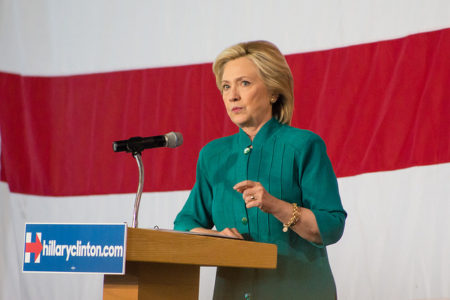By Peter Ward October 21, 2016
Hyperloop’s Hangups
Hyperloop concept art. ©By Camilo Sanchez – Own work, CC BY-SA 4.0
Elon Musk’s proposal to build a high speed train called the Hyperloop between Los Angeles and San Francisco, and the difficulties that project faced, were the subject of a feature in New York Magazine this week.
The Hyperloop began as a 58-page proposal, drawn up by Space X founder Elon Musk, which detailed the technology that would be required to create a near supersonic train in a pneumatic tube for travel between the two California cities. The inspiration for the project came to Musk one day when he was stuck in traffic and late for a meeting.
Musk imagined that his Hyperloop would revolutionize transportation, and turn the journey between L.A. and San Francisco into a 35-minute trip. He claimed that building it would cost only 6% of what it cost to build the California High Speed Rail, a government project currently being built between L.A. and San Francisco.
When Musk’s plans were first announced, they were met with skepticism among scientists and transportation planners, but the idea attracted headlines and investment, and a company was formed to build it.
The press remained positive in the early months of the project, but internally the company was falling apart. Among other problems, some at the company blamed executive chairman Shervin Pishevar for a “misuse of company resources.” A dispute between Pishevar and co-founder Brogan BamBrogan (his actual name) developed, reaching its pinnacle when BamBrogan reported finding a rope tied on his chair like a noose, and claimed it had been put there by Pishevar.
Now the company has been forced to shift from its original vision. Estimates of the cost of building the proposed Hyperloop have risen to 60% of the construction cost of the California High Speed Rail. Further the train will most likely not be built in California, but rather on a flatter terrain in a place that has more public money available for such projects, such as Dubai.
The Obamacare Gap

Doctor visit ©Laura Smith
The Affordable Care Act was signed into law in 2010, and although the number of uninsured people is at a record low, there are still 27 million people without health insurance. An interactive article published by Bloomberg this week delves deeper into the numbers.
When the law was signed there were 47 million people without insurance in the U.S., almost double what it is now.
But one of the problems the program has faced is that younger, healthier Americans haven’t signed up to get insurance. There are 5.98 million people between the ages of 26 and 34 without insurance, compared to 3.53 million aged 55 to 64. Because younger people are healthier, and less likely to make a claim, they are the ideal customers for health insurance providers.
Of the 27 million uninsured, about 7 million people are living below the poverty line – earning around $24,000 for a family of four. Another approximate 7 million people make between one and two times that amount.
The next sign up season, the period when people can enroll in Affordable Health Care programs, is fast approaching. As premiums are expected to rise by an average of 25% next year and big insurers like UnitedHealth Group are leaving some markets, how things unfold over the next few months will be key to the future of the law.
Clinton Foundation Scrutiny

Democrat presidential candidate Hillary Clinton. ©Gregory Hauenstein
As the U.S. election grows closer, the number of stories emerging on companies buying influence in politics grows. The latest, by USA Today, examines the relationship between private companies, the Clinton family foundations and the U.S. State Department when Hillary Clinton was in charge.
The report states that a dozen companies that gave money to the Clinton Foundation also lobbied the State Department using lobbyists who doubled as major Clinton campaign fundraisers.
The companies gave $16 million to the Clinton charities, and at least four of the lobbyists they hired were supporters of Hillary who raised more than $100,000 for her during her current presidential bid.
USA Today obtained federal lobbying data from the Center for Responsive Politics for 2009-2013, the time when Clinton was Secretary of State. That data was then compared to the donor lists made public by Clinton nonprofits and federal campaign finance records.
But several of the companies that were contacted by USA Today told the website that they had done nothing illegal. The Clinton campaign also denied any wrongdoing. “We have no record of Secretary Clinton meeting with these individuals as Secretary regarding issues they were lobbying on at the time. The fact remains, Hillary Clinton never took action as Secretary of State because of donations to the Clinton Foundation,” her campaign said.
Wine Production Drops
Vinedo Puente Alto, Chilean vineyard. ©By Fsanchezs – Own work, CC BY-SA 3.0
Wine lovers around the world may have cause to worry, as unfavorable weather caused a drop in production in the industry.
Wineries in the southern hemisphere, in particular, have cut back sharply on production, according to data from the International Organization of Vine and Wine (OIV)-especially Chile and Argentina. Argentina saw a production drop of 35% over the past year and Chile 21%. South American vineyards were badly affected by excess rain this year, possibly due to the El Nino effect. France was also hit by frost, hailstorms, drought and fruit rot that is expected to leave its 2016 levels of production at a four year low.
In fact, the volume of wine produced in 2016 worldwide was among the three lowest years in the past two decades, according to the organization.
But not all wineries are suffering. Australia, New Zealand and the U.S. are expected to report an increase in production for this year. These countries did not suffer through the same adverse weather conditions that the South American countries did.
This Week’s Top Headlines
U.S. Jobless Claims Climbed in Week Following Hurricane Matthew – Eric Morath, The Wall Street Journal
Tesla announces fully self-driving system – Michael Martinez, Melissa Burden, The Detroit News
Verizon says it’s “still evaluating” Yahoo discount as carrier sees another quarter of revenue decline – Ingrid Lunden, Anthony Ha, TechCrunch
Walgreens sees Rite Aid deal closing in early 2017 – Sruthi Ramakrishnan, Reuters
Apple complains Amazon’s US site is selling fake products – BBC
Nestlé cuts sales forecast as it battles ‘tough’ conditions – Ralph Atkins, Financial Times
Saudi Arabia raises $17.5bn from bonds to repair damage to public finances – Larry Elliott, The Guardian
Mortgage rates reach their highest levels in four months – Kathy Orton, The Washington Post
Airline On-Time Rates Are About to Get Worse – Justin Bachman, Bloomberg News
DiCaprio to co-operate in probe into Malaysia’s 1MDB scandal – BBC
This entry was posted on Friday, October 21st, 2016 at 4:07 pm. It is filed under Week in Review. You can follow any responses to this entry through the RSS 2.0 feed.
Comments are closed.
